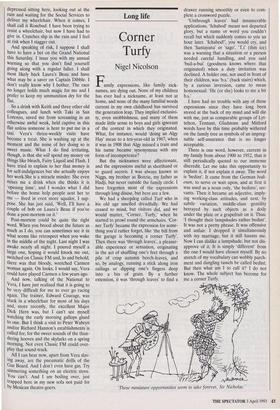Long life
Corner Turfy
Nigel Nicolson
Family expressions, like family nick- names, are dying out. None of my children has ever had a nickname, at least not at home, and none of the many familial words current in my own childhood has survived the generation leap. They implied exclusivi- ty, even snobbishness, and many of them made little sense to boys and girls ignorant of the context in which they originated. What, for instance, would 'doing an Algy Hay' mean to a ten-year-old in 1967, when it was in 1908 that Algy missed a train and his name became synonymous with any form of incompetence?
But the nicknames were affectionate, and the expressions useful as shorthand or to guard secrets. I was always known as Niggs, my brother as Bonzie, my father as Hadji, but never outside the family circle. I have forgotten most of the expressions through long disuse, but here are a few.
We had a sheepdog called Turf who in his old age smelled dreadfully. We had ceased to mind, but visitors did, and we would mutter, 'Corner, Turfy,' when he started to prowl round the armchairs. 'Cor- ner Turfy' became the expression for some- thing you'd rather forget, like 'the bill from the garage is becoming a corner Turfy'. Then there was 'through leaves', a pleasur- able experience or sensation, originating in the act of shuffling one's feet through a pile of crisp autumn beech-leaves, and so, by analogy, running a stick along iron railings or dipping one's fingers deep into a bin of grain. By a further extension, it was 'through leaves' to find a drawer running smoothly or even to com- plete a crossword puzzle.
`Unthrough leaves' had innumerable applications. `Ichabod' meant not departed glory, but a name or word you couldn't recall but which suddenly comes to you an hour later. `Ichabod!', you would cry, and then `Santayana' or 'sago'. 'TT (thin ice) was a warning that a situation or a person needed careful handling, and you said `bull-a-bui' (goodness knows where that originated) when a duty invitation was declined. A bolder one, not used in front of their children, was `b.s.' (back stairs) which, by a curious inversion, came to mean homosexual: 'He (or she) looks to me a bit b.s.'
I have had no trouble with any of these expressions since they have long been stored at the back of my mind and will die with me, just as comparable groups of Lyt- telton, Tennant, Gladstone and Mitford words have by this time probably withered on the family tree as symbols of an impreg- nable self-assurance that is no longer acceptable.
There is one word, however, current in my family from about 1900 to 1952, that is still periodically quoted to our immense discredit. Let me take this opportunity to explain it, if not explain it away. The word is tedint'. It came from the German bedi- enen, to serve or wait upon, and at first it was used as a noun only, 'the bedints', ser- vants. Then it became an adjective, imply- ing working-class attitudes, and next, by subtle variation, middle-class gentility betrayed by such objects as a doily under the plate or a grapefruit on it. Thus: `I thought their lampshades rather bedint'. It was not a pretty phrase. It was offensive and unfair. I dropped it simultaneously with my marriage, but it still haunts me. Now I can dislike a lampshade, but not dis- approve of it. It is simply 'different' from the one I would have chosen myself. By no stretch of my vocabulary can wobbly parch- ment and dangling tassels be called bedint. But then what am I to call it? I do not know. The whole subject has become for me a corner Turfy.
'These miniature opportunities seem to take forever, Sir Nicholas.'


















































 Previous page
Previous page